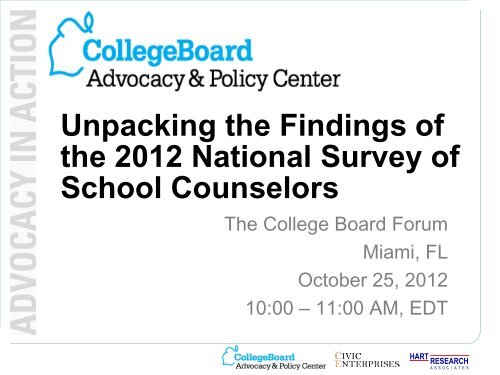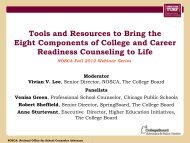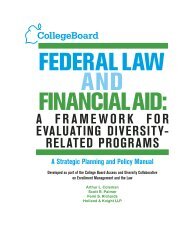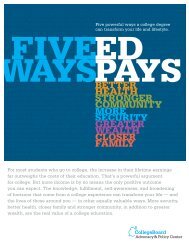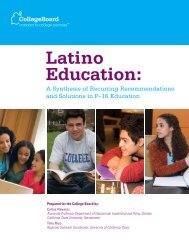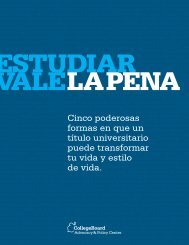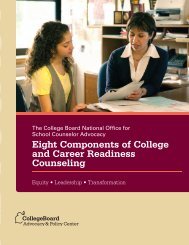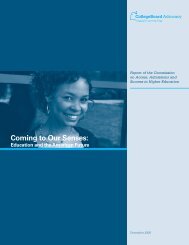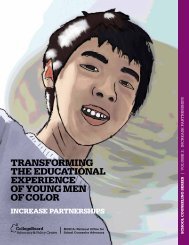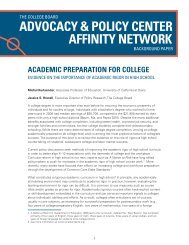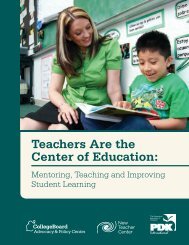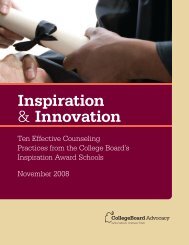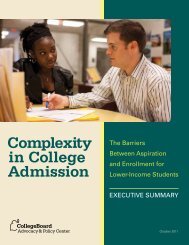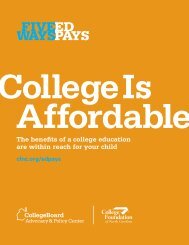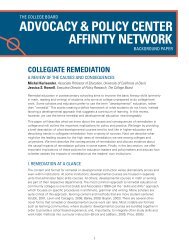Findings from the 2012 National Survey of School Counselors
Findings from the 2012 National Survey of School Counselors
Findings from the 2012 National Survey of School Counselors
Create successful ePaper yourself
Turn your PDF publications into a flip-book with our unique Google optimized e-Paper software.
Unpacking <strong>the</strong> <strong>Findings</strong> <strong>of</strong><br />
<strong>the</strong> <strong>2012</strong> <strong>National</strong> <strong>Survey</strong> <strong>of</strong><br />
<strong>School</strong> <strong>Counselors</strong><br />
The College Board Forum<br />
Miami, FL<br />
October 25, <strong>2012</strong><br />
10:00 – 11:00 AM, EDT<br />
HART RESEARCH<br />
A S S O C I A T E S
Agenda<br />
• Opening & Introductions<br />
• About <strong>the</strong> <strong>Survey</strong><br />
• Overview <strong>of</strong> <strong>the</strong> 2011 <strong>Survey</strong><br />
• Review <strong>of</strong> <strong>the</strong> <strong>2012</strong> <strong>Survey</strong><br />
• Moderated Panel Discussion<br />
• Q&A Session<br />
• Final Statements<br />
2<br />
HART RESEARCH<br />
A S S O C I A T E S
Today’s Panelists<br />
• Mary Bruce<br />
Education Policy Analyst<br />
Civic Enterprises<br />
• Beverly Hutton<br />
Director <strong>of</strong> Pr<strong>of</strong>essional Development<br />
<strong>National</strong> Association <strong>of</strong> Secondary <strong>School</strong> Principals<br />
(NASSP)<br />
• Patricia Martin<br />
Assistant Vice President<br />
<strong>National</strong> Office for <strong>School</strong> Counselor Advocacy<br />
(NOSCA), The College Board<br />
3<br />
HART RESEARCH<br />
A S S O C I A T E S
About <strong>the</strong> <strong>Survey</strong><br />
4<br />
HART RESEARCH<br />
A S S O C I A T E S
The College Board’s<br />
<strong>National</strong> <strong>Survey</strong> for <strong>School</strong> <strong>Counselors</strong><br />
• Launched by Advocacy & Policy Center’s<br />
<strong>National</strong> Office for <strong>School</strong> Counselor Advocacy<br />
(NOSCA)<br />
• Supported by The Kresge Foundation<br />
• Annual <strong>Survey</strong>, 2 yrs out (2011, <strong>2012</strong>)<br />
5<br />
HART RESEARCH<br />
A S S O C I A T E S
Rationale for <strong>Survey</strong><br />
• The need for a national, state & local push for increasing<br />
student achievement and college & career readiness.<br />
• The absence <strong>of</strong> a school counseling presence in education<br />
reform efforts.<br />
• The need for national transmission <strong>of</strong> <strong>the</strong> school counselor<br />
voice to a wide range <strong>of</strong> influential organizations, policymakers,<br />
education leaders and practitioners.<br />
• The lack <strong>of</strong> understanding <strong>of</strong> <strong>the</strong> value and needs <strong>of</strong> school<br />
counselors to improve college and career readiness.<br />
6<br />
HART RESEARCH<br />
A S S O C I A T E S
Intended Use <strong>of</strong> <strong>the</strong> <strong>Survey</strong> Results<br />
• To influence <strong>the</strong> pr<strong>of</strong>essional standards for <strong>the</strong> role and<br />
responsibilities <strong>of</strong> school counselors that result in positive<br />
student performance outcomes.<br />
• To help place school counselors at <strong>the</strong> center <strong>of</strong> education<br />
reform efforts and <strong>the</strong> national conversation on improving<br />
education outcomes.<br />
• To establish a national baseline that pr<strong>of</strong>essional<br />
organizations, foundations & researchers can draw upon to<br />
monitor changes and growth.<br />
• To inform policy/policymakers <strong>of</strong> <strong>the</strong> types <strong>of</strong> legislation and<br />
support needed to guide school counselor training & practice<br />
standards.<br />
7<br />
HART RESEARCH<br />
A S S O C I A T E S
Overview: <strong>National</strong> <strong>Survey</strong> <strong>of</strong><br />
<strong>School</strong> <strong>Counselors</strong><br />
2011 <strong>Survey</strong><br />
8<br />
HART RESEARCH<br />
A S S O C I A T E S
2011 <strong>Survey</strong> Reports<br />
Literature Review<br />
Technical Report<br />
Narrative Report<br />
9<br />
HART RESEARCH<br />
A S S O C I A T E S
2011 <strong>National</strong> <strong>Survey</strong> <strong>of</strong> <strong>School</strong> <strong>Counselors</strong>:<br />
Counseling at a Crossroads<br />
• Explored school counselors’ opinions and perspectives about roles,<br />
responsibilities, pr<strong>of</strong>essional relationships, practices and priorities<br />
for <strong>the</strong> future.<br />
• Focused on college readiness, leadership, and equity.<br />
• Online survey <strong>of</strong> 5,308 counselors<br />
– 1,327 middle school counselors<br />
– 3,981 high school counselors<br />
• <strong>Survey</strong> dates: April 19 – June 6, 2011<br />
• <strong>National</strong>ly representative sample<br />
10<br />
HART RESEARCH<br />
A S S O C I A T E S
2011<br />
Key <strong>Findings</strong><br />
Mission<br />
Leadership<br />
Training<br />
Accountability<br />
11<br />
HART RESEARCH<br />
A S S O C I A T E S
Review: <strong>National</strong> <strong>Survey</strong> <strong>of</strong><br />
<strong>School</strong> <strong>Counselors</strong><br />
<strong>2012</strong> <strong>Survey</strong><br />
12<br />
HART RESEARCH<br />
A S S O C I A T E S
<strong>2012</strong> <strong>Survey</strong> Reports<br />
Technical Report<br />
Narrative Report<br />
13<br />
HART RESEARCH<br />
A S S O C I A T E S
2011<br />
Crossroads<br />
<strong>2012</strong><br />
True North<br />
14<br />
HART RESEARCH<br />
A S S O C I A T E S
<strong>2012</strong> <strong>Counselors</strong> <strong>Survey</strong> Guiding Vision<br />
• In <strong>the</strong> 2011 “Counseling at a Crossroads” survey,<br />
counselors endorse a common goal: a College<br />
and Career Readiness Agenda called<br />
“Utopia ISD” in <strong>2012</strong> focus groups.<br />
“Utopia ISD”<br />
• The Eight Components <strong>of</strong> College and Career<br />
Readiness are endorsed as <strong>the</strong> road forward.<br />
• So <strong>the</strong> question for <strong>2012</strong> becomes:<br />
What are <strong>the</strong> roadblocks?<br />
<strong>School</strong> They Work in Now<br />
Potential Roadblocks:<br />
•Counselor commitment<br />
•Administration support<br />
•Resources<br />
•Knowledge and training<br />
•Effectiveness, Accountability…<br />
15<br />
HART RESEARCH<br />
A S S O C I A T E S
<strong>2012</strong> <strong>National</strong> <strong>Survey</strong> <strong>of</strong> <strong>School</strong> <strong>Counselors</strong><br />
Removing Roadblocks for Progress<br />
Add New Voices<br />
• The <strong>2012</strong> focus groups and survey include <strong>the</strong><br />
perspectives <strong>of</strong> school administrators.<br />
Build on, Explore, and Expand on 2011 Key<br />
<strong>Findings</strong><br />
• Training<br />
• Equality and Equity<br />
• Accountability and Effectiveness<br />
16<br />
HART RESEARCH<br />
A S S O C I A T E S
Methodology<br />
<strong>School</strong> <strong>Counselors</strong><br />
• Online survey <strong>of</strong> 2,890 school counselors<br />
– 2,084 high school counselors<br />
– 806 middle school counselors<br />
• <strong>Survey</strong> fielded May 1 to June 18, <strong>2012</strong><br />
• <strong>National</strong>ly representative<br />
Administrators<br />
• Online survey <strong>of</strong> school administrators, including principals, vice<br />
principals, and assistant principals<br />
• <strong>Survey</strong> fielded May 17 – June 5, <strong>2012</strong><br />
• <strong>National</strong>ly representative<br />
17<br />
HART RESEARCH<br />
A S S O C I A T E S
<strong>2012</strong><br />
Key <strong>Findings</strong><br />
Efficacy<br />
Training<br />
Accountability<br />
Aligned Resources<br />
18<br />
HART RESEARCH<br />
A S S O C I A T E S
Efficacy<br />
Training<br />
Accountability<br />
19<br />
HART RESEARCH<br />
A S S O C I A T E S
Efficacy Key <strong>Findings</strong><br />
2011: <strong>Counselors</strong> have high expectations, but <strong>the</strong><br />
reality in <strong>the</strong>ir schools falls far short <strong>of</strong> <strong>the</strong>ir<br />
hopes.<br />
<strong>2012</strong>: <strong>Counselors</strong>’ and administrators’ views are<br />
strikingly similar on ideals and<br />
opportunities. They share a belief in<br />
counselors’ ability to help boost student<br />
success.<br />
20<br />
HART RESEARCH<br />
A S S O C I A T E S
<strong>Counselors</strong> and Administrators Share Vision<br />
<strong>of</strong> Education System<br />
This is a very good fit* with my own view:<br />
<strong>Counselors</strong> (2011)<br />
Administrators<br />
To ensure that all students, regardless <strong>of</strong> background, have equal access to a high-quality education<br />
To ensure that all students complete <strong>the</strong> 12th grade ready to succeed in college and careers<br />
To ensure that all students earn a high school diploma<br />
95%<br />
95%<br />
92%<br />
93%<br />
To maintain an orderly environment where motivated students are able to learn<br />
86%<br />
89%<br />
86%<br />
92%<br />
To achieve continued improvement on state and national tests <strong>of</strong> student learning and knowledge<br />
59%<br />
67%<br />
*8-10 ratings on zero-to-ten scale: 10 = perfectly fits my view <strong>of</strong> what <strong>the</strong> mission <strong>of</strong> an ideal school system should be<br />
21<br />
HART RESEARCH<br />
A S S O C I A T E S
<strong>Counselors</strong> and Administrators Agree on Path<br />
to Achieve <strong>School</strong> Goals = Eight Components<br />
I am very committed to/strongly support my counselors* doing this:<br />
Academic planning for college and career readiness<br />
Connect college and career exploration and selection processes<br />
College aspirations<br />
College and career admission processes<br />
College and career assessments<br />
Transition <strong>from</strong> high school graduation to college enrollment<br />
College affordability planning<br />
Enrichment and extracurricular engagement<br />
<strong>Counselors</strong> (2011)<br />
73%<br />
72%<br />
77%<br />
77%<br />
75%<br />
79%<br />
79%<br />
77%<br />
79%<br />
82%<br />
81%<br />
Administrators<br />
*8-10 ratings on zero-to-ten scale: 10 = completely committed to/completely support my counselors doing this to ensure all graduate college/career ready<br />
81%<br />
85%<br />
89%<br />
87%<br />
90%<br />
22<br />
HART RESEARCH<br />
A S S O C I A T E S
<strong>Counselors</strong> See Potential to Improve Student-<br />
Outcome Measures<br />
High school counselors who believe <strong>the</strong> counseling staff at <strong>the</strong>ir school can be<br />
very effective* at improving each measure<br />
Completion <strong>of</strong> college prep sequence <strong>of</strong> courses<br />
83%<br />
College application rates<br />
82%<br />
Students gaining access to advanced classes/tests<br />
81%<br />
Transcript audits <strong>of</strong> graduation readiness<br />
78%<br />
High school graduation rates<br />
77%<br />
*8-10 ratings on zero-to-ten scale: 10 = counseling staff at my school could be extremely effective<br />
23<br />
HART RESEARCH<br />
A S S O C I A T E S
High <strong>School</strong> Administrators More Likely to Say<br />
They Take Advantage <strong>of</strong> <strong>Counselors</strong>’ Abilities<br />
My school takes advantage <strong>of</strong> counselors’ abilities in this area*:<br />
48%<br />
54%<br />
HS <strong>Counselors</strong> (2011)<br />
Establish a relationship <strong>of</strong> trust with students and be ano<strong>the</strong>r adult to talk to in<br />
situations <strong>of</strong> conflict<br />
Work proactively as student advocates to create pathways to support students’<br />
postsecondary goals<br />
Trained to deal with whole student and address all issues that can affect students’<br />
ability to learn<br />
57%<br />
61%<br />
Focus on students’ long term plans and help connect <strong>the</strong>ir goals to <strong>the</strong>ir<br />
coursework<br />
Align <strong>the</strong>ir work with <strong>the</strong> school’s goals for closing <strong>the</strong> achievement gap in<br />
rigorous coursework<br />
*8-10 ratings on zero-to-ten scale: 10 = My school takes full advantage <strong>of</strong> this unique role and special contribution<br />
66%<br />
71%<br />
71%<br />
73%<br />
73%<br />
HS Administrators<br />
81%<br />
Gap<br />
8<br />
12<br />
17<br />
14<br />
18<br />
24<br />
HART RESEARCH<br />
A S S O C I A T E S
Efficacy<br />
Training<br />
Accountability<br />
25<br />
HART RESEARCH<br />
A S S O C I A T E S
Training Key <strong>Findings</strong><br />
2011: <strong>Counselors</strong> are highly educated, yet 28%<br />
believe <strong>the</strong>ir training did not prepare <strong>the</strong>m<br />
well for <strong>the</strong>ir job.<br />
<strong>2012</strong>: There is a significant correlation between<br />
counselors’ in-service/pre-service training<br />
and student outcomes, though <strong>the</strong> direction<br />
<strong>of</strong> causality is unclear.<br />
26<br />
HART RESEARCH<br />
A S S O C I A T E S
Graduate <strong>School</strong>s Not Making College and<br />
Career Readiness a Priority<br />
Extensively covered this in grad school Adequately covered Inadequately covered Did not cover<br />
College and career assessments<br />
11%<br />
45%<br />
Academic planning for college and career readiness<br />
College aspirations<br />
10%<br />
39%<br />
9%<br />
40%<br />
Transition <strong>from</strong> high school graduation to college enrollment<br />
9%<br />
39%<br />
Connect college and career exploration and selection processes<br />
29%<br />
27%<br />
32%<br />
10%<br />
36%<br />
35%<br />
28%<br />
16%<br />
22%<br />
24%<br />
20%<br />
19%<br />
Enrichment and extracurricular engagement<br />
9%<br />
37%<br />
29%<br />
25%<br />
College and career admission processes<br />
6%<br />
30%<br />
32%<br />
32%<br />
College affordability planning<br />
5%<br />
28%<br />
30%<br />
37%<br />
0% 10% 20% 30% 40% 50% 60% 70% 80% 90% 100%<br />
27<br />
HART RESEARCH<br />
A S S O C I A T E S
Many <strong>Counselors</strong> Feel They Need Additional<br />
Training on <strong>the</strong> Components<br />
I have sufficient knowledge/need no fur<strong>the</strong>r training<br />
I have little or no knowledge/need extensive training<br />
I have some knowledge/need some additional training<br />
Academic planning for college and career readiness<br />
College aspirations<br />
College and career admission processes<br />
College and career assessments<br />
57%<br />
40%<br />
56%<br />
42%<br />
51%<br />
44%<br />
50%<br />
46%<br />
Connect college and career exploration and selection processes<br />
Enrichment and extracurricular engagement<br />
College affordability planning<br />
49%<br />
48%<br />
48%<br />
48%<br />
43%<br />
50%<br />
Transition <strong>from</strong> high school graduation to college enrollment<br />
38%<br />
56%<br />
3%<br />
2%<br />
5%<br />
4%<br />
3%<br />
4%<br />
7%<br />
6%<br />
0% 10% 20% 30% 40% 50% 60% 70% 80% 90% 100%<br />
28<br />
HART RESEARCH<br />
A S S O C I A T E S
Efficacy<br />
Training<br />
Accountability<br />
29<br />
HART RESEARCH<br />
A S S O C I A T E S
Accountability Key <strong>Findings</strong><br />
2011: The majority <strong>of</strong> counselors support certain<br />
accountability measures and incentives for<br />
counselors to meet <strong>the</strong> 12th-grade college<br />
and career-ready goal.<br />
<strong>2012</strong>: <strong>Counselors</strong> and administrators agree on<br />
some measures <strong>of</strong> accountability; current<br />
accountability systems are inconsistently<br />
implemented.<br />
30<br />
HART RESEARCH<br />
A S S O C I A T E S
Administrators and <strong>Counselors</strong> Agree on<br />
Certain Accountability Measures<br />
Proportions who think it is fair to be held accountable* for each measure<br />
High <strong>School</strong><br />
Middle <strong>School</strong><br />
<strong>Counselors</strong><br />
Administrators<br />
<strong>Counselors</strong><br />
Administrators<br />
Transcript audits <strong>of</strong><br />
graduation readiness<br />
60%<br />
82%<br />
Middle school<br />
completion rates<br />
46%<br />
62%<br />
College application<br />
rates<br />
57%<br />
74%<br />
Promotion <strong>from</strong> grade<br />
to grade<br />
38%<br />
59%<br />
High school graduation<br />
rates<br />
52%<br />
75%<br />
* 6-10 ratings on zero-to-ten scale: 10 = it is completely fair to use this measure/changes in this measure assess counselors<br />
31<br />
HART RESEARCH<br />
A S S O C I A T E S
Accountability Systems Inconsistent<br />
High school counselors who say <strong>the</strong>y are held accountable for <strong>the</strong>se outcomes<br />
Student Outcome Measurements<br />
Non-Student Outcome Measurements<br />
High school graduation rates<br />
Dropout rates<br />
College acceptance rates<br />
College application rates<br />
Student access to advanced<br />
classes/tests (AP, IB, Honors, etc.)<br />
Completion <strong>of</strong> college prep<br />
sequence <strong>of</strong> courses<br />
Transcript audits <strong>of</strong> graduation<br />
readiness<br />
52%<br />
39%<br />
39%<br />
39%<br />
38%<br />
38%<br />
36%<br />
<strong>School</strong> counseling program<br />
development<br />
Administrative/clerical tasks<br />
Coordinating tests<br />
Scheduling IEP and 504<br />
meetings<br />
Creating <strong>the</strong> master schedule<br />
Attendance checking and<br />
verification<br />
Disciplinary actions<br />
74%<br />
69%<br />
60%<br />
35%<br />
33%<br />
23%<br />
13%<br />
State test scores<br />
29%<br />
Substitute teaching<br />
8%<br />
FAFSA completion rates<br />
16%<br />
Writing IEPs<br />
3%<br />
Graduate employment rates<br />
11%<br />
O<strong>the</strong>r measurements<br />
26%<br />
20% <strong>of</strong> high school counselors say <strong>the</strong>ir school doesn’t have a system <strong>of</strong> accountability.<br />
32<br />
HART RESEARCH<br />
A S S O C I A T E S
Self-Efficacy Correlates with Support for<br />
Accountability Measures<br />
For each measure, proportions who think it is fair to be held accountable (6-10*)<br />
by whe<strong>the</strong>r <strong>the</strong>y think <strong>the</strong>y can be effective on <strong>the</strong> measure<br />
HS counselors who think <strong>the</strong>y can be very effective on this measure (8-10*)<br />
HS counselors who do not think <strong>the</strong>y can be effective on this measure (0-7*)<br />
Transcript audits <strong>of</strong> graduation readiness<br />
35%<br />
38%<br />
Students gaining access to advanced classes/tests<br />
Completion <strong>of</strong> college prep sequence <strong>of</strong> courses<br />
College application rates<br />
High school graduation rates<br />
College acceptance rates<br />
FAFSA completion<br />
19%<br />
26%<br />
30%<br />
37%<br />
37%<br />
53%<br />
51%<br />
60%<br />
65%<br />
69%<br />
68%<br />
74%<br />
* Ratings on zero-to-ten scales: 10 = I can be extremely effective/it is completely fair<br />
33<br />
HART RESEARCH<br />
A S S O C I A T E S
Efficacy<br />
Training<br />
Accountability<br />
34<br />
HART RESEARCH<br />
A S S O C I A T E S
Conclusion<br />
<strong>School</strong> counselors are ready to lead.<br />
99% say that <strong>the</strong>y should exercise leadership in advocating for students’ access to<br />
rigorous academic preparation, as well as for o<strong>the</strong>r college and career readiness<br />
counseling, even if o<strong>the</strong>rs in <strong>the</strong> school do not see counselors in this leadership role.<br />
Administrators support <strong>the</strong>m.<br />
98% agree that school counselors should exercise<br />
leadership in advocating for students.<br />
How do we get <strong>the</strong>re?<br />
Clarity <strong>of</strong> mission and <strong>the</strong> belief that <strong>the</strong>y can get <strong>the</strong>re<br />
Appropriate training<br />
Accountability that encourages student outcomes<br />
Aligned resources<br />
35<br />
HART RESEARCH<br />
A S S O C I A T E S
Moderated Panel Discussion<br />
36<br />
HART RESEARCH<br />
A S S O C I A T E S
Q&A Session<br />
Moderator: Christen Pollock, Vice President,<br />
The College Board, Advocacy &<br />
Policy Center<br />
• Panelists<br />
• Live Audience and Online Participants<br />
37<br />
HART RESEARCH<br />
A S S O C I A T E S
Final Statements<br />
38<br />
HART RESEARCH<br />
A S S O C I A T E S
For additional information or questions regarding<br />
<strong>the</strong> <strong>2012</strong> <strong>National</strong> <strong>Survey</strong> <strong>of</strong> <strong>School</strong> <strong>Counselors</strong>,<br />
please visit NOSCA’s website at<br />
nosca.collegeboard.org.<br />
Thank you for joining us today!<br />
39<br />
HART RESEARCH<br />
A S S O C I A T E S


